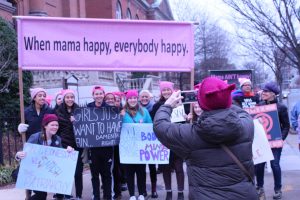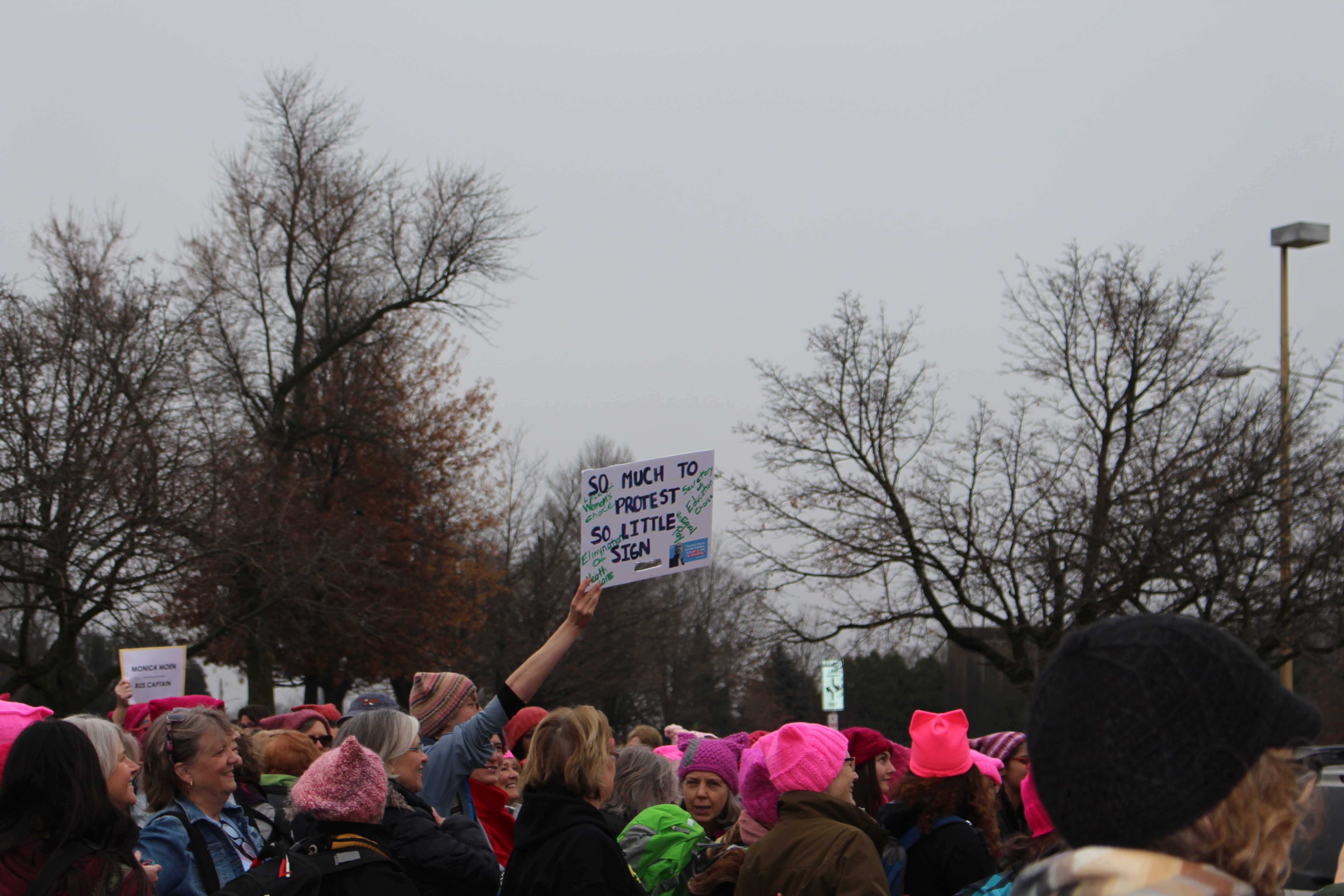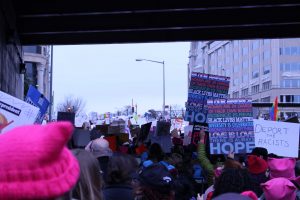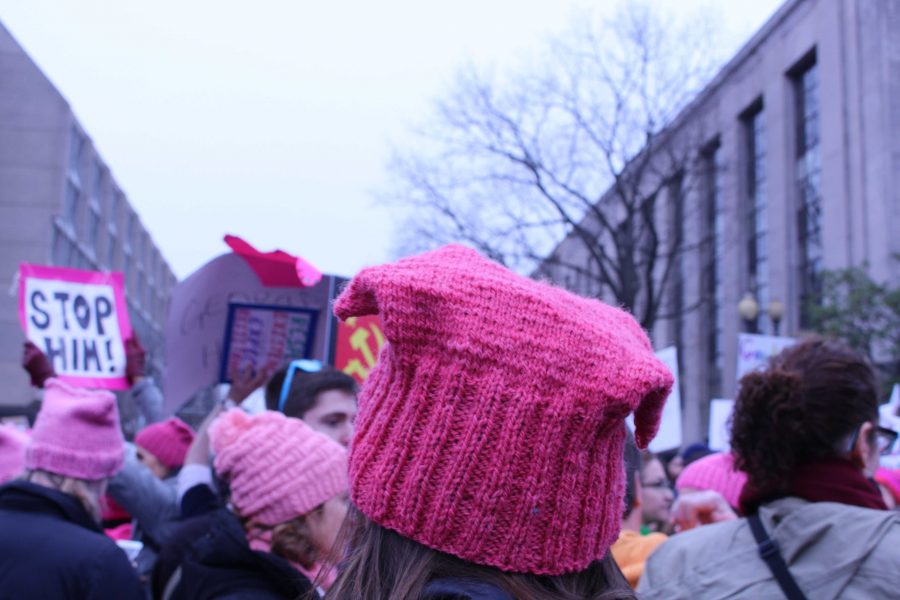Women’s March on Washington — a closer look at the issues.
By Lily Abromeit
[email protected]
WASHINGTON — Five days ago, I boarded a bus with a group of 56 strangers from eastern Iowa to make the 15-hour trip to Washington, D.C.
I wasn’t on the bus as a protester or a friend; instead, I was there as a reporter. While we were in D.C., I covered the women’s and men’s reactions post-march, the chants and songs being sung throughout the day, and tried to learn the many, many reasons so many people traveled miles to converge on one place for one day.
It would be impossible to go into detail what every individual was fighting for. But like most instances of coverage of a big event, I had a lot of interviews left over that seemed important enough to share.
Here are some of the issues I heard the most about at the Women’s March on Washington.
***
Even though Johanna Widuch from New Jersey said she hates to talk bad about anyone, she couldn’t help herself when it came to the new president of the United States.
“… They said anyone [could] be president, and they just proved that,” she said during the Women’s March on Washington Jan. 21.
Widuch was one of the thousands in attendance at the Women’s March on Washington who was there not for one specific reason but for many.
“It’s the whole picture,” she said.
D.C. resident Evan Donnelly said this solidarity for everyone fighting for these many different reason could be effective.

“History has proven [protesting] does have the power to effect change,” he said. “When you’re able to gather so many people who believe the same thing, it shows that it’s [real].”
However, while most said they wanted to see change in many different areas, many held signs or chanted phrases aimed at one specific goal.
Women’s Rights
Lynnea Amend of Portland, Oregon, majored in women’s studies in college but, she says, it has been ingrained in her forever to not rest until women are equal.
On Jan. 21, Amend wore a sash that read “Deeds not words” on one side, and “Ms. Universal Healthcare” on the other.
“We’re standing on the shoulders of giants,” she said. “I made the banner “deeds not words” because it was the slogan of the suffragette movement, and I wanted to pay homage to them.”
The side resting against her back was WAS, meant to poke fun at the Miss Universe Pageant, of which President Trump is famous for previously owning. Amend said it is an example of the exploitation of women. But she also wanted to tie in her passion for universal health care.
”I hope to see everyone have affordable access to health care, and it’s such a women’s issue,” she said. “Being able to access that for all people, that’s a human right.”
According to Obamacare.com, the Affordable Care Act made it possible for “tens of millions of uninsured people” to get health insurance, but this could soon change. Many Republicans would rather see a system of single-payer because they think the current system doesn’t do enough.
Additionally, others want to see parts of the law approved, such as keeping the ban on pre-existing conditions.
However, according to the Obama administration, polls show that many Americans do not understand the complexities of what the Affordable Care Act does.

In Iowa, according to the U.S. Department of Health and Human Services, “The data show that the uninsured rate in Iowa has fallen by 46 percent since the Affordable Care Act (ACA) was enacted in 2010, translating into 132,000 Iowans gaining coverage.”
Inequality between women’s health care and men’s is something Kathryn Ellis, a resident of D.C., fought for on Jan. 21, too.
“That’s not fair just because you’re born female,” she said, noting that women have to pay for such services as birth control that they can’t necessarily control because of their gender.
Another women’s issue was brought up loud and clear on Jan. 21: the right to choose. Many protesters carried signs in support of Planned Parenthood and drawings of uteruses. A van driving through the streets of D.C. before the march showed crude photos of fetuses, claiming Planned Parenthood sells fetus parts post-abortions (not true).
Becky Leaven, a newly retired nurse from Iowa City, spent more than 35 years in women’s health.
“I remember with clarity when Roe v. Wade became a reality,” she said in an email. “As my daughters matured, I would remind them that Roe v. Wade is not a given, that it could go away.
At the time, it seemed impossible this could ever happen.
“I have been giving thought to where I want to put my time and energies in this next phase of my life. November came, and it became clear that there is much to be done to ensure rights that we have taken for granted remain.”
The back of Ellis’ sign represented something many women also said they fight for. It read, “Equal work for equal pay.”
Overall, women in the U.S. are paid 80 cents for every $1 a man is paid, according to the National Partnership for Women and Families. This makes the annual wage gap $10,470.
In Iowa, the wage gap is even larger — women are paid 77 cents to every $1 a man makes. Of the top 20 wage earners in Iowa, two are women.
Ellis said her sign spoke for itself.
“Oh yeah, that’s self-explanatory,” she said. “We deserve equal pay for equal work.”
Environment
Mary Trachsel, a marcher from Iowa City, said she was in D.C. mostly because of wanting to protect women’s reproductive rights, but also the environment — specifically, defending the environment from “unsustainable economic exploitation.”
Trachsel was not alone along the march route. There were a number of signs in the shape of the Earth, noting the importance of the environment and science.

Last week, officials announced that Earth’s surface temperatures during the year 2016 were a record high. In fact, they were the warmest since modern recordkeeping of the temperatures
began in 1880, according to NASA and the National Oceanic & Atmospheric Administration.
Critics of global climate change often argue that there is no consensus, that the climate has changed before, or that the models are not reliable. (At least 97 percent of climate scientists disagree.)
Tiffany Burns, a marcher in D.C. from Batavia, Illinois, said she believes this kind of thinking is threatening.
“I think that his picks for the EPA [Scott Pruitt] and secretary of State [Rex Tillerson] are dangerous,” she said. “I think they don’t understand the effects of global warming on the not only the United States but on the world.
“I think saying global warming is a hoax perpetrated by the Chinese is irresponsible and dangerous.”
Immigration
Karen Mixon’s mother came to the U.S. as an immigrant from Germany in 1952. During the Women’s March on Washington, she wore a cape that supported immigrants in the country.
“The U.S. has always been stronger because of immigrants, and now is not the time to weaken our country and divorce ourselves from the responsibility we have to the world,” she said. “Just because immigrants are black or brown doesn’t make them any less human.”

Mixon, who is from Atlanta, said she is also strongly against a Muslim registry, a sort of database to track Muslims in the country.
“What is going on around the world, not just here, people are reconnecting to a collective power that we have to do the right thing,” she said.
Education
Education was among one of the most popular topics discussed at the march in D.C. on Jan. 21.
This was due, in part, to the recent congressional hearing of Betsy DeVos, Trump’s pick for secretary of the Education Department.
During the hearing, DeVos was questioned about different aspects of education in the U.S., and many people criticized what seemed to be a lack of knowledge about some very critical areas.
“I have a son with special needs, and it concerns me that DeVos has no understanding at all of special-education law,” said Mandy Athy, a mother from Iowa City who made the trip with her daughter. “That public education is a right for everyone — to make that understood — that is an important issue.”
For people such as Athy, changes in education policy could bring a lot of consequences.
“She’s a big-charter advocate, and my son is expensive to get educated, and they would have the opportunity to tell him no, that he couldn’t attend that school,” Athy said. “And if there are really no public schools left, I don’t know what we would do.”
Mary Sloss, a teacher in New Orleans, is concerned about whole other items.
She is a teacher in a Title I school, meaning a lot of the families of the kids she teaches depend on federal programs.
She said the Education-secretary nominee makes her nervous. She’s worried that such things as Medicaid, SNAP funding, and general federal funding used to keep schools similar to hers open
will be put under strain.
“Betsy DeVos wants to give that to the state,” she said, and she thinks the standards need to be kept the same across the country.
Some educators in the crowd also work with kids who would be negatively affected by changes similar to the ones Sloss is anxious about.
Dan Gordon was in D.C. with a group of such educators, all of whom work in different states for a federally funded program that provides services to youth who come from disadvantaged backgrounds.
Many of these youths are Muslim kids or kids from different countries.
The amount of hateful rhetoric those kids hear, even from the highest levels, is shocking, Gordon said.
“We spend a lot of time trying to bring the message of teaching self-respect of all … what we’re seeing is a repudiation of all of that,” he said. “We’re standing up rather just being angry and miserable because of what happened with the election.
“We’re encouraging and supporting one another … and articulating the idea that we won’t be ‘that’ country.”




